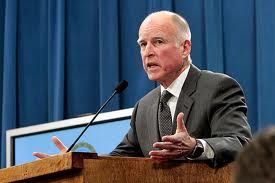May Revise Blows $6.6 B Tax Windfall
By JOHN SEILER
Call it Government Math. In his January budget proposal for fiscal 2011-12, Gov. Jerry Brown insisted on $12 billion in yearly tax increases to help close a $25 billion budget deficit. Today, in his May Revise to the budget, he announced that the state will enjoy $6.6 billion in new revenues because of the ongoing economic recovery.
“He changed the revenue estimate from January. Everybody was saying we should do it because of the added revenue,” Esmael Adibi told me; he’s Director of the A. Gary Anderson Center for Economic Research and Anderson Chair of Economic Analysis at Chapman University.
For most people, that would mean: $12 billion minus $6.6 billion = $5.4 billion tax increases (or more budget cuts) still needed. But under Government Math, Brown said almost double that, $9.3 billion, in tax increases still were needed.
“It’s a disappointment,” Adibi lamented. “In spite of the increases in revenue, he didn’t change his position on taxes.”
Shouldn’t the obvious plan be to keep stoking the fires of economic recovery through more reasonable tax and regulatory policies? That way, the windfall revenues would continue growing, eventually being large enough to fund more state spending.
No. Gov. Brown, who in the past was considered an innovative politician, now is stuck in static thinking. He can’t think outside the box. He doesn’t see that, before more revenue can be spent, it first must be created by a re-invigorated private sector.
Brown said he needed to take some of that unexpected $6.6 billion in and use it to end the “smoke and mirrors” of previous budgets. But in January, didn’t he say he already had eliminated the “smoke and mirrors” of budgets from the departed Schwarzenegger administration?
At his January 3 inaugural, given before his January budget was released a week later, he pledged: “First, speak the truth. No more smoke and mirrors on the budget. No empty promises.”
But today, he decried as “borrowing from the future” even some of the numbers from his January budget. Certainly, some of this is true. He pointed out that the state now has to start paying back $500 million a year on the $10 billion it borrowed from the federal government to pay unemployment insurance claims. (Of course, if the state would ease up on its severe anti-business climate, and start creating more jobs, those claims would be a lot smaller.)
Prop. 98 Funds
In the budget, Adibi observed, “The biggest thing is what we do with Proposition 98,” which mandates that about 40 percent of state spending be spent on K-14 schools. “During the recession, it had to be cut. Now there is a $9 billion maintenance factor” on it, which is supposed to be made up for annually.
Brown pointed out that the tax increases will be needed to pay back $3 billion this year “borrowed” from Prop. 98 spending. But Prop. 98 ratchets spending upward during good times, such as the real-estate boom of the mid-2000s, then doesn’t allow reductions during bust times, as happened after the economy crashed in 2007.
The obvious solution to this ratchet effect — which obviously cannot be sustained — is for the Legislature to suspend Prop. 98. Just don’t pay that $3 billion.
The governor also pointed out that the state still is supposed to issue $48.2 billion in general obligation bonds that have been approved by voters. It will have to then start paying interest on the debt.
But the solution there also is obvious: Don’t issue the bonds until the state has the capacity to pay for them. Does the state really need to go into hock for the $9 billion high-speed train that’s an obvious boondoggle?
November election?
During the question-and-answer session after his budget announcement, Brown said that he still wants voter approval for the tax increases — which he calls “tax extensions” — with “the fall” being the best date. That would mean November. And he said he favors putting a spending limitation measure before voters.
Of course, the details are what matter for any spending limitation measure. In 2004, voters passed Proposition 56 with an overwhelming 71 percent of the vote. According to Ballotpedia, “Proposition 58 requires state legislators to pass a balanced budget every year.” But it contained so many loopholes that it never worked.
Brown also threatened, “If we don’t get the tax extensions, there will be all sorts of new tax initiatives.” He mentioned Senate President Pro Tem Darrell Steinberg’s proposal to allow local tax increases on incomes, vehicles, cigarettes, etc. And Brown mentioned proposals by “unions.” He didn’t specify it, but the California Teachers Association is talking up an added tax in the wealthy.
Brown even brought up a phrase he used before, from philosopher Thomas Hobbes: “war of all against all” if his tax increases weren’t passed by recalcitrant Republicans in the Legislature. But Hobbes was a royal absolutist. And isn’t America supposed to be a free republic? Or do we have King Jerry?
Brown did insist, correctly, that if Republicans don’t support his elimination of enterprise zones, the $1.7 billion saved would have to be taken care of with tax increases. Except for Assemblyman Chris Norby, R-Fullerton, every GOP legislator has voted for continuing this destructive waste.
Republicans, however, did propose a more sensible alternative budget that balances without tax increases or education cuts. Brown didn’t refer to it at all, perhaps hoping that it would disappear.
Budget Battle
The Budget Battle now will be joined in earnest. The California Constitution requires that the budget be passed by June 15. But this year, for the first time, if legislators don’t pass a budget on time, their pay will be docked.
The government-worker unions, as I noted in an article today, already are increasing their propaganda campaign for “tax extensions.” But with $6.6 billion in unexpected revenue flowing into the state treasury, the sell isn’t going to be as easy as it was before.
War of all against all? More like war of the government against taxpayers.
Related Articles
Which California cities will be Germany or Greece under Prop 31?
Sept. 6, 2012 By Wayne Lusvardi Carles B. Warren, a real estate economist and appraiser in Pleasant Hill, California, asks:
The right way, the wrong way, and the Poway of school bond financing
Aug. 8, 2012 By Wayne Lusvardi Imagine you can get in a time machine and fast-forward to the year 2032
The economics of football stadiums
CalWatchdog.com has run several stories on the National Football League’s maneuvers with the Los Angeles market, which currently doesn’t have a




